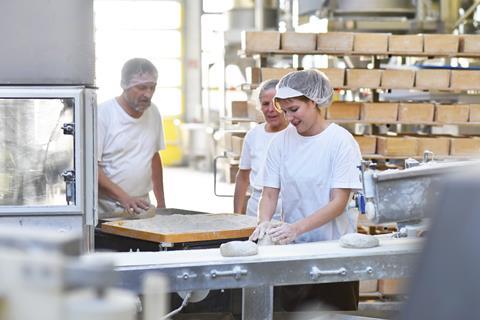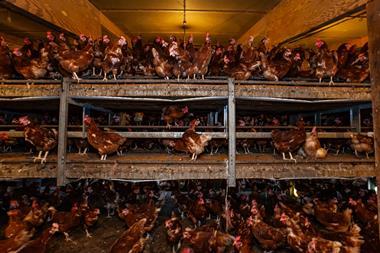
-
Manufacturers who use fine powder ingredients issue staff with face masks as part of their standard health and safety policies
-
Factories fear they could be forced to shut down en masse if the government changes its advice on masks
-
Companies are being advised to “maximise the use life” of PPE by checking and cleaning the equipment
Food companies have been advised they may have to reduce the use of personal protective equipment among staff because of shortages in supply, The Grocer can reveal.
New guidance from the Health & Safety Executive, in an open letter to food companies, says that in some cases workers will have to wear less effective masks, because of shortages of availability due to the coronavirus outbreak.
The guidance comes amid fears factories could be forced to shut down en masse if the government changes its advice on masks.
Suppliers have told The Grocer they fear their factories could be left “paralysed within days” if the advice is changed, with companies warning of a 20-fold increase in mask demand in food production alone, before taking into account demand from millions of members of the public.
Manufacturers who use fine powder ingredients, including seasonings, flavourings, stabilisers, cocoa and flour, as well as powdered household products, issue staff with face masks as part of their standard health and safety policies. Their use is widespread across sectors such as fresh, chilled and long-life foods.
But in its new advice, the HSE urges companies to look to minimise their use because of the lack of supplies due to the “unprecedented” situation.
The HSE letter says that because of the “extraordinary” demands of the crisis it has reviewed advice for companies, including urging them to “only provid[e] PPE to those workers who need it”.
Read more:
-
Absenteeism panic is over, but now food producers face a PPE problem
-
Food suppliers fear factories could be ‘paralysed’ by face mask recommendation
-
Retail display manufacturer Kesslers shifts to PPE production
The new advice also advises companies to “maximise the use life” of PPE by upping the number of checks and cleaning on equipment.
But it also acknowledges that because of a shortage of suppliers in the crisis, some workers may have to use less effective equipment than normal.
This includes masks used to protect for inhaling of flour dust, where workers usually have to use masks with a so called “assigned protection factor” (APF) of at least 20.
The letter says: “HSE recognises however that the availability of PPE with an APF of 20 may be reduced due to Covid-19.”
It says employers should, in such cases, look to use masks with an APF of 10, which could be made safe enough to use alongside other measures such as using non-stick coatings on conveyor belts and greaseproof paper on trays instead of flouring surfaces, and using low-dust flours.
The letter adds: “In bakeries, breathing in flour dust can be a significant risk as it can cause occupational asthma. We are aware that currently there is a restricted supply of dust masks (PPE) across many parts of the food industry and that many employers still rely on them to control exposure to hazardous substances.
“Suitable control can often be achieved using good working practices and local exhaust ventilation (engineering controls) which then means that employees do not need to wear dust masks; reducing overall pressure on the supply chain.”
The HSE letter comes amid growing concern in the industry about the possible impact of guidance on masks.
Experts from the government’s Sage (Scientific Advisory Group for Emergencies) group met yesterday to consider new evidence amid a growing belief their use will be recommended as a way to slow the spread of the virus, despite lack of evidence they are effective.
Ministers are understood to have tried to reassure the industry they will not act until sufficient supplies for NHS frontline workers, such as nurses and other vital key workers, are safeguarded.
However, sources have expressed huge uncertainty over how the government can keep a lid on demand.
Despite official advice from PHE only two weeks ago saying masks were not necessary in food factories, companies are also facing union disquiet over staff safety during the crisis.



















No comments yet